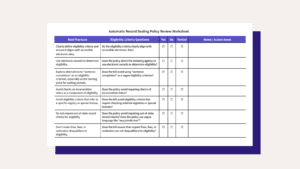- News and Stories
- Blog post
- Criminal Justice
How Advocates Can Make Automatic Record Sealing the Norm Nationwide

After years of work with The Clean Slate Initiative, advocates, and lawmakers in the state, our Clear My Record team was elated to see the legislature in Illinois pass an automatic record sealing bill. This legislation will seal records for nearly 2 million eligible people living with a criminal record. For individuals, this means having access to employment, housing, education, and more. For communities across Illinois, it means putting more people back to work and strengthening local economies. With the addition of Illinois, 13 states and the District of Columbia now have passed automatic record sealing legislation. This is a moment of major progress for Illinois and for the Clean Slate movement.
The fact that Illinois is the 13th state to pass Clean Slate legislation shows us how far automatic record sealing has come, but it’s also a reminder of how far we have to go. Each of the 37 states that haven’t yet passed a bill represents an opportunity to change lives for millions of people whose only option for record sealing currently is the petition-based process. Unlike automatic record sealing, petition-based record sealing is complicated and costly, essentially requiring someone to have a legal degree or hire an expensive legal firm to help. Therefore, it’s no surprise that less than 10 percent of eligible people successfully clear their records through petition-based systems.
At Code for America, the Clear My Record team’s work is rooted in the fundamental belief that government should be easy to navigate, removing barriers to opportunity whenever possible. With today’s technology, automatic record sealing can be a routine government process. But, for these recently passed Clean Slate laws to deliver meaningful change, states must have the technical infrastructure and tools to transform words in a bill into real-word action. In other words, the government must be able to implement the law. That’s why we’ve re-released The Advocate’s Guide to Automatic Record Sealing.
For these recently passed Clean Slate laws to deliver meaningful change, states must have the technical infrastructure and tools to transform words in a bill into real-word action.
Our original guide for advocates interested in advancing automatic record sealing policies was a primer on the people and entities involved in the record sealing process and practical steps for making Clean Slate bills technically feasible for government to implement. Now, we’re introducing a brand new policy review worksheet. The goal of this tool is to maximize the guide’s impact by making it easy to compare draft policies to Clean Slate standards. After reading the guide, advocates can use the worksheet as they examine each section of a draft policy to evaluate elements like eligibility criteria and process design and then revise the draft as needed.
Making automatic record sealing the norm across the nation is possible—but it’ll take collective effort. Clean Slate is now a reality in Illinois because of the people who came together to make it so, many of whom are advocates. We know that this spirit of fighting for change isn’t limited to Illinois, and we’re hopeful that our guide and the policy review worksheet will make the road to Clean Slate easier for advocates working tirelessly on the ground across the country.
Interested in learning more about the Advocate’s Guide to Automatic Record Sealing? Read the guide and check out our February 2025 webinar with The Clean Slate Initiative.
Are you involved in a Clean Slate campaign and/or looking for advice on specific, technical questions? Please contact us at clearmyrecord@codeforamerica.org with any questions.